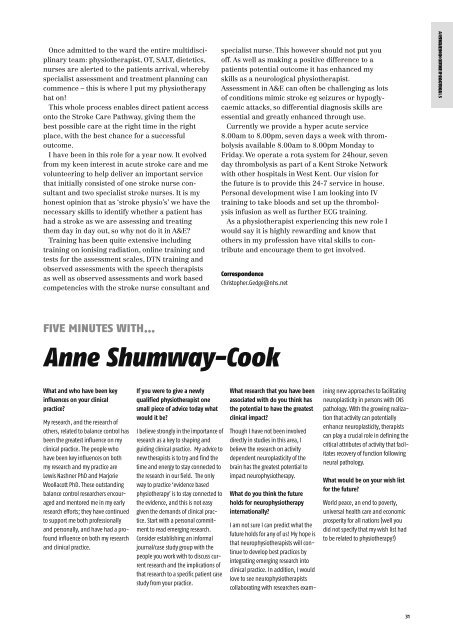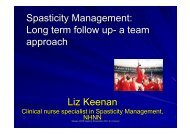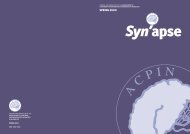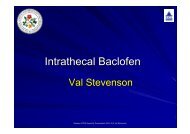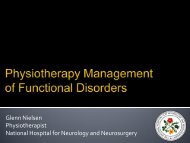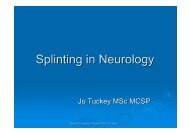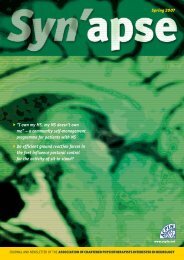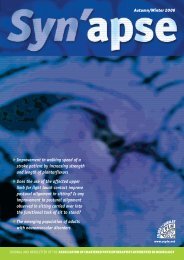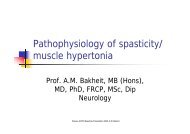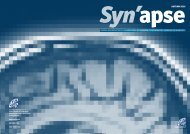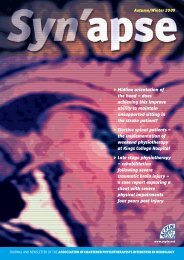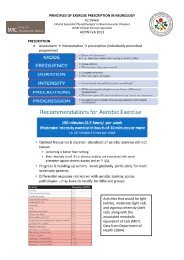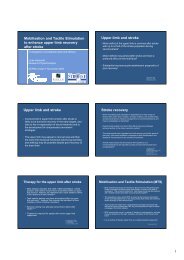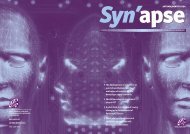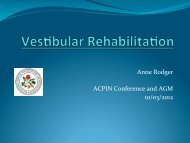SYNAPSE Spring 2009 - acpin
SYNAPSE Spring 2009 - acpin
SYNAPSE Spring 2009 - acpin
Create successful ePaper yourself
Turn your PDF publications into a flip-book with our unique Google optimized e-Paper software.
Once admitted to the ward the entire multidisciplinary<br />
team: physiotherapist, OT, SALT, dietetics,<br />
nurses are alerted to the patients arrival, whereby<br />
specialist assessment and treatment planning can<br />
commence – this is where I put my physiotherapy<br />
hat on!<br />
This whole process enables direct patient access<br />
onto the Stroke Care Pathway, giving them the<br />
best possible care at the right time in the right<br />
place, with the best chance for a successful<br />
outcome.<br />
I have been in this role for a year now. It evolved<br />
from my keen interest in acute stroke care and me<br />
volunteering to help deliver an important service<br />
that initially consisted of one stroke nurse consultant<br />
and two specialist stroke nurses. It is my<br />
honest opinion that as ‘stroke physio’s’ we have the<br />
necessary skills to identify whether a patient has<br />
had a stroke as we are assessing and treating<br />
them day in day out, so why not do it in A&E?<br />
Training has been quite extensive including<br />
training on ionising radiation, online training and<br />
tests for the assessment scales, DTN training and<br />
observed assessments with the speech therapists<br />
as well as observed assessments and work based<br />
competencies with the stroke nurse consultant and<br />
specialist nurse. This however should not put you<br />
off. As well as making a positive difference to a<br />
patients potential outcome it has enhanced my<br />
skills as a neurological physiotherapist.<br />
Assessment in A&E can often be challenging as lots<br />
of conditions mimic stroke eg seizures or hypoglycaemic<br />
attacks, so differential diagnosis skills are<br />
essential and greatly enhanced through use.<br />
Currently we provide a hyper acute service<br />
8.00am to 8.00pm, seven days a week with thrombolysis<br />
available 8.00am to 8.00pm Monday to<br />
Friday. We operate a rota system for 24hour, seven<br />
day thrombolysis as part of a Kent Stroke Network<br />
with other hospitals in West Kent. Our vision for<br />
the future is to provide this 24-7 service in house.<br />
Personal development wise I am looking into IV<br />
training to take bloods and set up the thrombolysis<br />
infusion as well as further ECG training.<br />
As a physiotherapist experiencing this new role I<br />
would say it is highly rewarding and know that<br />
others in my profession have vital skills to contribute<br />
and encourage them to get involved.<br />
Correspondence<br />
Christopher.Gedge@nhs.net<br />
ARTICLES SHARING GOOD OTHER PRACTICE JOURNALS<br />
FIVE MINUTES WITH…<br />
Anne Shumway-Cook<br />
What and who have been key<br />
influences on your clinical<br />
practice?<br />
My research, and the research of<br />
others, related to balance control has<br />
been the greatest influence on my<br />
clinical practice. The people who<br />
have been key influences on both<br />
my research and my practice are<br />
Lewis Nashner PhD and Marjorie<br />
Woollacott PhD. These outstanding<br />
balance control researchers encouraged<br />
and mentored me in my early<br />
research efforts; they have continued<br />
to support me both professionally<br />
and personally, and have had a profound<br />
influence on both my research<br />
and clinical practice.<br />
If you were to give a newly<br />
qualified physiotherapist one<br />
small piece of advice today what<br />
would it be?<br />
I believe strongly in the importance of<br />
research as a key to shaping and<br />
guiding clinical practice. My advice to<br />
new therapists is to try and find the<br />
time and energy to stay connected to<br />
the research in our field. The only<br />
way to practice ‘evidence based<br />
physiotherapy’ is to stay connected to<br />
the evidence, and this is not easy<br />
given the demands of clinical practice.<br />
Start with a personal commitment<br />
to read emerging research.<br />
Consider establishing an informal<br />
journal/case study group with the<br />
people you work with to discuss current<br />
research and the implications of<br />
that research to a specific patient case<br />
study from your practice.<br />
What research that you have been<br />
associated with do you think has<br />
the potential to have the greatest<br />
clinical impact?<br />
Though I have not been involved<br />
directly in studies in this area, I<br />
believe the research on activity<br />
dependent neuroplasticity of the<br />
brain has the greatest potential to<br />
impact neurophysiotherapy.<br />
What do you think the future<br />
holds for neurophysiotherapy<br />
internationally?<br />
I am not sure I can predict what the<br />
future holds for any of us! My hope is<br />
that neurophysiotherapists will continue<br />
to develop best practices by<br />
integrating emerging research into<br />
clinical practice. In addition, I would<br />
love to see neurophysiotherapists<br />
collaborating with researchers examining<br />
new approaches to facilitating<br />
neuroplasticity in persons with CNS<br />
pathology. With the growing realization<br />
that activity can potentially<br />
enhance neuroplasticity, therapists<br />
can play a crucial role in defining the<br />
critical attributes of activity that facilitates<br />
recovery of function following<br />
neural pathology.<br />
What would be on your wish list<br />
for the future?<br />
World peace, an end to poverty,<br />
universal health care and economic<br />
prosperity for all nations (well you<br />
did not specify that my wish list had<br />
to be related to physiotherapy!)<br />
31


